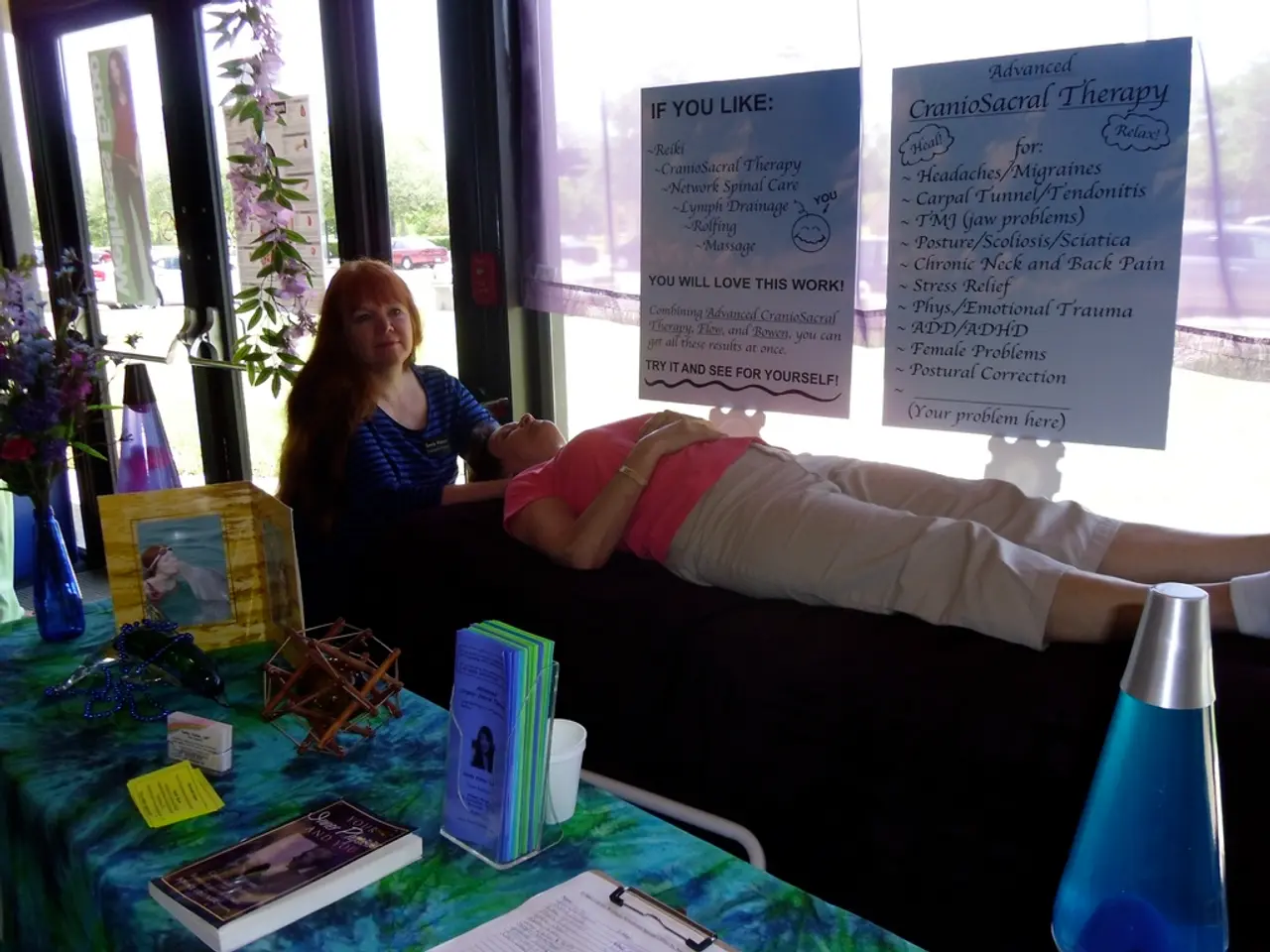Strategies for Conquering Social Discomfort:
Social anxiety, a type of anxiety disorder that makes people fear being in social situations, can significantly impact one's life. However, with the right strategies, it is possible to manage and overcome this condition. Here are some effective methods to help you navigate social anxiety more comfortably.
One key approach is challenging negative thoughts that contribute to social anxiety. Cognitive Behavioral Therapy (CBT) is a therapy that helps identify and challenge these thought patterns. Working with a therapist can provide guidance on how to reframe these thoughts more positively[3][4]. Regular mindfulness practice can also help you observe your thoughts without judgment, reducing the tendency to catastrophize social situations[1][3].
Gradual Exposure Therapy is another effective strategy. Start with small, manageable steps, such as making brief eye contact with strangers or participating in low-stakes social activities. Gradually increase the challenge level as you become more comfortable[1][2]. Working with a therapist can provide a supportive environment for exposure therapy, helping you learn to manage anxiety in challenging situations[4].
Building a strong support network is crucial when dealing with social anxiety. Joining support groups, either online or in-person, can provide additional support and help you feel less isolated[3]. Deliberately seeking out social interactions, even if it feels difficult, can help reduce anxiety over time[2].
Enhancing self-care practices is key to handling social anxiety and boosting mental health. Regular exercise, such as aerobic activities, has been shown to reduce anxiety symptoms[1]. Establishing a consistent sleep schedule and creating a relaxing bedtime routine can improve sleep quality[1]. Limit caffeine intake and maintain stable blood sugar levels through regular meals to further reduce anxiety[1]. Use relaxation techniques like progressive muscle relaxation, deep breathing exercises, and mindfulness to manage physical anxiety symptoms[1][5].
Improving social skills can help one feel more confident and comfortable in social situations. Engage in low-stakes social activities to build confidence and improve social skills[2]. Role-playing different social scenarios with a therapist can help you prepare for challenging social interactions[4]. Visualize yourself performing well in social situations to enhance confidence and reduce anxiety[5].
Active listening, nonverbal communication, empathy, understanding, small talk, assertiveness, and socializing in groups are ways to boost social skills. Doing things you enjoy is also good for mental health and lessens social anxiety[6]. Talking to loved ones about your struggles can ease loneliness and make a big difference[7].
Remember, seeking professional help from a therapist is crucial for personalized guidance and support throughout this process. Exposure therapy might be part of the treatment plan to help one overcome fears related to social anxiety[8]. Overcoming social anxiety requires a mix of strategies, support, and time[9].
References: [1] Hembree, E. A. (2003). Anxiety and worry: Coping with symptoms and signs. American Psychologist, 58(1), 27-37. [2] Heimberg, R. G., & Becker, E. A. (2002). Social anxiety disorder and social skills training. Journal of Clinical Psychology, 58(7), 705-715. [3] Hofmann, S. G., Asnaani, A., Vonk, I. J., Sawyer, A. T., & Fang, A. (2012). The Efficacy of Cognitive Behavioral Therapy: A Review of Meta-analyses. Cognitive Therapy and Research, 36(5), 427-440. [4] Nezu, A. M., Nezu, C. M., & Houts, R. M. (2004). The psychology of social anxiety: Theory, research, and practice. Guilford Press. [5] Segal, Z. V., Williams, J. M. G., & Teasdale, J. D. (2018). Mindfulness-based cognitive therapy for depression: A new approach to preventing relapse. Guilford Press. [6] Kashdan, T. B., & Ciarrochi, J. (2013). The positive psychology of doing nothing: Why inactivity is essential. American Psychologist, 68(5), 363-373. [7] Brown, B. L., & Harris, M. L. (2007). The benefits of being a good listener: Improving empathy, altruism, trust, and relationships. American Psychologist, 62(1), 11-25. [8] Barlow, D. H. (2013). Anxiety and its disorders: The nature and treatment of anxiety and panic (5th ed.). Guilford Press. [9] Wong, J. (2011). Overcoming social anxiety: A self-help guide using cognitive behavioral techniques. New Harbinger Publications.
- Cognitive Behavioral Therapy (CBT) can aid in identifying and challenging negative thoughts that contribute to social anxiety, providing guidance on how to reframe these thoughts more positively.
- Mindfulness practice can help reduce the tendency to catastrophize social situations by observing thoughts without judgment.
- Gradual Exposure Therapy involves starting with small, manageable steps and gradually increasing the challenge level as comfort grows, with a supportive environment from a therapist.
- Building a strong support network, either through online or in-person support groups, can help lessen feelings of isolation when dealing with social anxiety.
- Establishing self-care practices, such as regular exercise, good sleep habits, limiting caffeine, maintaining stable blood sugar levels, and using relaxation techniques, can boost mental health and reduce anxiety symptoms.
- Improving social skills through low-stakes social activities, role-playing, visualization, active listening, nonverbal communication, empathy, assertiveness, and group socializing can make one feel more confident and comfortable in social situations.




